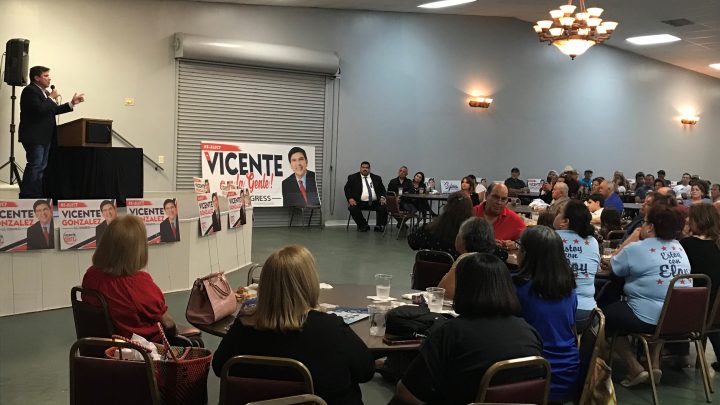
Texas redistricting changes how congressional candidates allocate money
Texas redistricting changes how congressional candidates allocate money

Texas gained two new congressional seats after the 2020 census showed explosive population growth, so the state redrew the lines of its congressional districts. After the redistricting, some voters — like retired accountant Ludim Farias — found themselves in a new district.
Farias recently attended a rally for Democratic Congressman Vicente Gonzalez at the La Sierra Event Center in Harlingen, in the southeastern corner of the state. She was excited to see him in person and said she was already seeing him constantly on TV.
“I watch TV most of the day, but I would say about four or five times,” she said, calculating how many Gonzalez ads she sees per day.
Finally, Gonzalez hopped up on the stage. After a stump speech stressing his ties to the region, Gonzalez plunged into the crowd, shaking hands and grinning for pictures.
Gonzalez has represented Texas’ 15th congressional district since 2017. But the Republican-dominated legislature redrew that district to include more Republicans. The new redistricting map put Gonzalez’s home into the adjacent 34th district, which has more Democrats, and he decided to run there.
“Well, we’re running a full campaign like we did the very first time,” he said. “We feel very positive. We’ve knocked on over 145,000 doors.”
The door knocking, events like this and all of those campaign ads are expensive. Gonzalez is raising and shelling out a lot of money to introduce himself to voters in his new district.
“He’s spent more than $3 million already this cycle versus just $471,000 in the prior cycle,” explained Sheila Krumholz, executive director of OpenSecrets, a nonprofit that tracks money in politics.
So far this election cycle, Gonzalez has raised $2.5 million — more than twice what he took in the last time he ran, Krumholz said.

Gonzalez’s opponent, Republican Congresswoman Mayra Flores, has raised more than $3 million, Krumholz said. The Flores campaign declined an interview request.

The big spending is over for the candidates vying for the state’s two new congressional seats, Krumholz added — like Democrat Greg Casar, who’s running for the new seat in heavily Democratic Austin.
“He’s already spent $1.4 [million] of $1.5 million,” Krumholz said.
Now that he’s won the primary, Casar is expected to coast to victory in the general election. The same goes for Republican Wesley Hunt, who’s running for the new congressional seat in Houston.
Now Casar and Hunt are donating to other candidates’ campaigns. Because, ”in Congress, if you’ve got money, you’ve got power,” said Brandon Rottinghaus, a political science professor at the University of Houston. “Spending it on people helps to build relationships. And that’s what members of Congress really need — especially if you want to move up the legislative ladder.”
Hunt is also donating to a super PAC aligned with House Minority Leader Kevin McCarthy. Party leaders typically reward that kind of generosity with spots on high-profile congressional committees.
There’s a lot happening in the world. Through it all, Marketplace is here for you.
You rely on Marketplace to break down the world’s events and tell you how it affects you in a fact-based, approachable way. We rely on your financial support to keep making that possible.
Your donation today powers the independent journalism that you rely on. For just $5/month, you can help sustain Marketplace so we can keep reporting on the things that matter to you.











